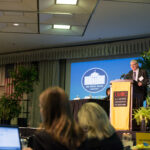
“What is UMBC�’s special sauce?” �That’s what Susan Singer, director of the National Science Foundation’�s Division of Undergraduate Education, pondered aloud when she took the stage on September 16, 2014, at an education workshop co-hosted by the White House and UMBC. How has UMBC so successfully supported students from all backgrounds, while many other universities struggle with lagging retention rates and achievement gaps, particularly in the sciences, technology, engineering and math (STEM)?
Later that morning, Dean Bill LaCourse revealed the UMBC recipe. We’�ve succeeded, he shared, through a commitment to inclusion, community of support, stable leadership, recognition of the diverse strengths students bring to the table, and a �”culture of assessment”� that elevates programs proven to boost student success.
The workshop, part of the White House’�s College Opportunity Initiative, was a dynamic gathering of college and university faculty and administrators, federal officials, and association and foundation staff focused on improving STEM education nationwide. Organized by the White House Domestic Policy Council and White House Office of Science and Technology Policy, the event explored how to improve teaching and learning in STEM courses and classrooms, and successful pathways for students as they move through STEM programs to jobs and graduate school.
President Barack Obama identified improving STEM education as a critical goal of his administration early in his first term and has already implemented several related initiatives. Recently, the President’�s Council of Advisors on Science and Technology urged the U.S. to take even more action to educate one million additional undergraduates in STEM over a decade.
In January 2014, the White House sponsored a College Opportunity Summit during which President Obama called for �”an ambitious new agenda aimed at improving college value, removing barriers to innovation and competition, and ensuring that student debt remains affordable.�” A key focus of that summit was helping more low-income youth succeed in critical STEM fields. A wide range of foundations, nonprofits, and college and university presidents responded to the president�’s call by announcing new steps to boost STEM achievement and broaden participation in these fields.
To build on this momentum, the White House workshop at UMBC provided an opportunity for education leaders to identify, evaluate, and scale-up innovative ways to improve STEM teaching and learning, to make STEM degrees more accessible to diverse students, and to boost degree completion.
Participants highlighted several UMBC programs regarded as national models, including the Meyerhoff Scholars Program and course redesign efforts to improve learning and retention, drawing on the innovative Chemistry Discovery Center as a key example.
UMBC Provost Philip Rous presented on UMBC�’s highly successful efforts to remove the achievement gap between students who enter as first-time, full-time freshman and those who transfer to UMBC from community colleges, focusing on the Gates Foundation-funded STEM Transfer Student Success Initiative. He reflected that the challenges UMBC faces aren’�t unique, but that at UMBC �”we have taken a very deliberate approach to how we change the culture and norms of the university, and we are very persistent in that.�”
As LaCourse suggested, the secret to the secret sauce is that it’�s not really a secret after all. It is our honest look in the mirror and commitment to balancing innovative teaching, leading-edge research, and a supportive community that make UMBC a national model.
The White House is planning three additional workshops around the country this fall at Florida International University; the University of Colorado Boulder; and California State University, Northridge.
Watch the introductory and plenary remarks and first panel of the STEM Education Workshop:
Image: UMBC Provost Philip Rous speaks at the White House College Opportunity Initiative workshop held at UMBC on September 16, 2014. Photo by Marlayna Demond ’11 for UMBC.





